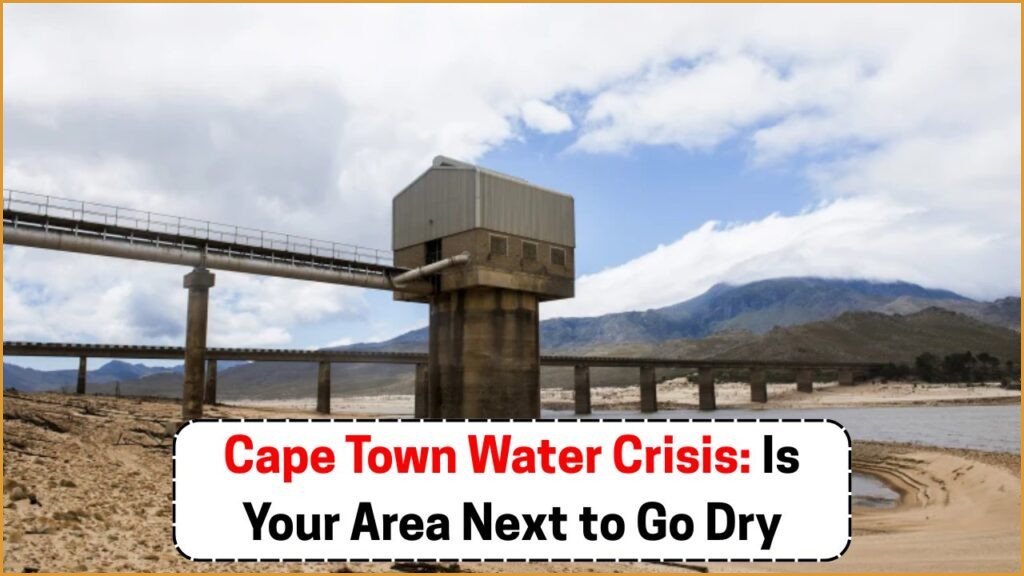Cape Town’s Water Crisis: In recent times, Cape Town has been grappling with a severe water crisis, a situation that has become increasingly urgent for residents and local authorities alike. The prospect of surviving six days without water supply has become a daunting reality for many neighborhoods. With climate change exacerbating weather patterns, it’s crucial to understand the implications of such a crisis on daily life and how communities can prepare for potential disruptions. As the Mother City faces these challenges, residents are urged to stay informed and proactive in their approach to water conservation and management.

Understanding the Roots of Cape Town’s Water Crisis
Water scarcity in Cape Town has been a long-standing issue, driven by a combination of factors including prolonged droughts, rapid urbanization, and inadequate infrastructure. The city’s water supply is heavily reliant on rainfall, which has been unpredictable and insufficient in recent years. This has led to the depletion of major dams that supply water to the city. The crisis peaked in 2018 when ‘Day Zero’, the day the taps would run dry, loomed large over residents, prompting urgent water-saving measures. Understanding the historical context of this crisis is crucial for developing sustainable solutions. Efforts are now focused on diversifying water sources through desalination plants, groundwater extraction, and promoting water-saving technologies. Despite these initiatives, the threat of another severe water shortage remains, making it imperative for both the government and citizens to collaborate on long-term water management strategies.
How Cape Town’s Water Shortage Affects Daily Life
The impact of Cape Town’s water crisis extends far beyond the inconvenience of restricted water use. It affects public health, economic activities, and the overall quality of life. Residents have had to adapt to stringent water usage limits, affecting everything from household chores to personal hygiene. Businesses, particularly those in water-intensive industries, face operational challenges and increased costs. The tourism sector, a significant contributor to the local economy, also feels the strain as water conservation measures can deter visitors. Schools and hospitals must implement strict water-saving protocols to ensure uninterrupted services. This crisis highlights the need for innovative solutions and public awareness campaigns to promote sustainable water use practices. By fostering a culture of conservation and resilience, Cape Town can better navigate future water challenges.
Potential Risks for Neighborhoods Amid Cape Town’s Water Crisis
As Cape Town continues to navigate its water crisis, neighborhoods across the city remain at risk of facing water shortages. The variability in water supply can lead to unequal distribution, with some areas experiencing more severe impacts than others. Vulnerable communities, particularly those in informal settlements, often bear the brunt of these shortages due to limited access to alternative water sources. The potential for six days without water supply is a stark reminder of the urgency to address these disparities. Local authorities are urged to prioritize equitable water distribution and invest in infrastructure improvements to mitigate the risks. Community engagement and education play a critical role in preparing neighborhoods for water shortages, ensuring that all residents have access to the resources they need to cope with the crisis.
 Missed SMS Alerts from SASSA on August 5? Here's How It Could Cost You R560 in Child Grants
Missed SMS Alerts from SASSA on August 5? Here's How It Could Cost You R560 in Child Grants
Preparing for Future Water Challenges in Cape Town
With the threat of water shortages looming, Cape Town must adopt a proactive approach to prepare for future challenges. This involves a combination of short-term measures and long-term strategies to ensure water security. Residents are encouraged to continue practicing water-saving habits, such as reducing shower times, fixing leaks, and using greywater systems. On a larger scale, the city is investing in alternative water sources, such as desalination and wastewater recycling, to augment the existing supply. Public awareness campaigns aim to educate citizens about the importance of water conservation and the collective effort required to manage this precious resource. By fostering a culture of sustainability and resilience, Cape Town can better equip itself to face the uncertainties of climate change and secure a reliable water future for its residents.
What are key strategies for surviving water scarcity in urban areas?
 Johannesburg South Plunged into Water Crisis: Thousands Suffer as Infrastructure Fails Overnight
Johannesburg South Plunged into Water Crisis: Thousands Suffer as Infrastructure Fails Overnight
Conservation, alternative sources, and community cooperation are essential.







